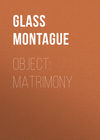Kitabı oku: «Elkan Lubliner, American», sayfa 2
"I am talking to Joseph Borrochson," Scheikowitz replied. "That's who I'm talking to."
"Well, there ain't no such person here," Polatkin retorted. "There's here only a young fellow by the name Elkan Lubliner, which he is my own father's sister a grandson, and he ain't no more a thief as you are."
"Ain't he?" Philip retorted. "Well, all I can say is he is a thief and his whole family is thieves, the one worser as the other."
Marcus glowered at his partner.
"You should be careful what you are speaking about," he said. "Maybe you ain't aware that this here boy's grandfather on his father's side was Reb Mosha, the big Lubliner Rav, a Chosid and a Tzadek if ever there was one."
"What difference does that make?" Philip demanded. "He is stealing my brother-in-law's passage ticket anyhow."
"I didn't steal it," the former Joseph Borrochson cried. "My father paid him good money for it, because Borrochson says he wanted it to marry the widow with; and you also I am paying a hundred dollars."
"Yow! Your father paid him good money for it!" Philip jeered. "A Ganef like your father is stealing the money, too, I bet yer."
"Oser a Stück," Polatkin declared. "I am sending him the money myself to help bury his aunt, Mrs. Lebowitz."
"You sent him the money?" Philip cried. "And your own partner you didn't tell nothing about it at all!"
"What is it your business supposing I am sending money to the old country?" Marcus retorted. "Do you ask me an advice when you are sending away money to the old country?"
"But the feller didn't bury his aunt at all," Philip said.
"Yes, he did too," the former Joseph Borrochson protested. "Instead of a hundred dollars the funeral only costs fifty. Anybody could make an overestimate. Ain't it?"
Marcus nodded.
"The boy is right, Philip," he said, "and anyhow what does this loafer come butting in here for?"
As he spoke he indicated Meyer Gifkin with a jerk of the chin.
"He ain't butting in here," Philip declared; "he comes in here because I told him to. I want you should make an end of this nonsense, Polatkin, and hire a decent assistant cutter. Gifkin is willing to come back for twenty dollars a week."
"He is, is he?" Marcus cried. "Well, if he was willing to come back for twenty dollars a week why didn't he come back before? Now it's too late; I got other plans. Besides, twenty dollars is too much."
"You know very well why I ain't come back before, Mr. Polatkin," Gifkin protested. "I was afraid for my life from that murderer Borrochson."
Philip scowled suddenly.
"My partner is right, Gifkin," he said. "Twenty dollars is too much."
"No, it ain't," Gifkin declared. "If I would be still working for you, Mr. Scheikowitz, I would be getting more as twenty dollars by now. And was it my fault you are firing me? By rights I should have sued you in the courts yet."
"What d'ye mean sue us in the courts?" Philip exclaimed. He was growing increasingly angry, but Gifkin heeded no warning.
"Because you are firing me just for saying a crook is a crook," Gifkin replied, "and here lately you found out for yourself this here Borrochson is nothing but a Schwindler– a Ganef."
"What are you talking about – a Schwindler?" Philip cried, now thoroughly aroused. "Ain't you heard the boy says Borrochson is marrying the landlord's widow? Could a man get married on wind, Gifkin?"
"Yow! he married the landlord's widow!" Gifkin said. "I bet yer that crook gambles away the money; and, anyhow, could you believe anything this here boy tells you, Mr. Scheikowitz?"
The question fell on deaf ears, however, for at the repetition of the word crook Philip flung open the office door.
"Out of here," he roared, "before I kick you out."
Simultaneously Marcus grabbed the luckless Gifkin by the collar, and just what occurred between the office and the stairs could be deduced from the manner in which Marcus limped back to the office.
"Gott sei Dank we are rid of the fellow," he said as he came in.
Although Philip Scheikowitz arrived at his place of business at half-past seven the following morning he found that Marcus and Elkan Lubliner had preceded him, for when he entered the showroom Marcus approached with a broad grin on his face and pointed to the cutting room, where stood Elkan Lubliner. In the boy's right hand was clutched a pair of cutter's shears, and guided by chalked lines he was laboriously slicing up a roll of sample paper.
"Ain't he a picture?" Marcus exclaimed.
"A picture!" Philip repeated. "What d'ye mean a picture?"
"Why, the way he stands there with them shears, Philip," Marcus replied. "He's really what you could call a born cutter if ever there was one."
"A cutter!" Philip cried.
"Sure," Marcus went on. "It's never too soon for a young feller to learn all sides of his trade, Philip. He's been long enough on the stock. Now he should learn to be a cutter, and I bet yer in six months' time yet he would be just so good a cutter as anybody."
Philip was too dazed to make any comment before Marcus obtained a fresh start.
"A smart boy like him, Philip, learns awful quick," he said. "Ain't it funny how blood shows up? Now you take a boy like him which he comes from decent, respectable family, Philip, and he's got real gumption. I think I told you his grandfather on his father's side was a big rabbi, the Lubliner Rav."
Philip nodded.
"And even if I didn't told you," Marcus went on, "you could tell it from his face."
Again Philip nodded.
"And another thing I want to talk to you about," Marcus said, hastening after him: "the hundred dollars the boy gives you you should keep, Philip. And if you are spending more than that on the boy I would make it good."
Philip dug down absently into his trousers pocket and brought forth the roll of dirty bills.
"Take it," he said, throwing it toward his partner. "I don't want it."
"What d'ye mean you don't want it?" Marcus cried.
"I mean I ain't got no hard feelings against the boy," Philip replied. "I am thinking it over all night, and I come to the conclusion so long as I started in being the boy's uncle I would continue that way. So you should put the money in the savings bank like I says yesterday."
"But – " Marcus protested.
"But nothing," Philip interrupted. "Do what I am telling you."
Marcus blinked hard and cleared his throat with a great, rasping noise.
"After all," he said huskily, "it don't make no difference how many crooks oder Ganevim is in a feller's family, Philip, so long as he's got a good, straight business man for a partner."
CHAPTER TWO
APPENWEIER'S ACCOUNT
HOW ELKAN LUBLINER GRADUATED INTO SALESMANSHIP
"WHEN I hire a salesman, Mr. Klugfels," said Marcus Polatkin, senior partner of Polatkin & Scheikowitz, "I hire him because he's a salesman, not because he's a nephew."
"But it don't do any harm for a salesman to have an uncle whose concern would buy in one season from you already ten thousand dollars goods, Mr. Polatkin," Klugfels insisted. "Furthermore, Harry is a bright, smart boy; and you can take it from me, Mr. Polatkin, not alone he would get my trade, but us buyers is got a whole lot of influence one with the other, understand me; so, if there's any other concern you haven't on your books at present, you could rely on me I should do my best for Harry and you."
Thus spoke Mr. Felix Klugfels, buyer for Appenweier & Murray's Thirty-second Street store, on the first Monday of January; and in consequence on the second Monday of January Harry Flaxberg came to work as city salesman for Polatkin & Scheikowitz. He also maintained the rôle of party of the second part in a contract drawn by Henry D. Feldman, whose skill in such matters is too well known for comment here. Sufficient to say it fixed Harry Flaxberg's compensation at thirty dollars a week and moderate commissions. At Polatkin's request, however, the document was so worded that it excluded Flaxberg from selling any of the concerns already on Polatkin & Scheikowitz's books; for not only did he doubt Flaxberg's ability as a salesman, but he was quite conscious of the circumstance that, save for the acquisition of Appenweier & Murray's account, there was no need of their hiring a city salesman at all, since the scope of their business operations required only one salesman – to wit, as the lawyers say, Marcus Polatkin himself. On the other hand, Klugfels had insisted upon the safeguarding of his nephew's interests, so that the latter was reasonably certain of a year's steady employment. Hence, when, on the first Monday of February, Appenweier & Murray dispensed with the services of Mr. Klugfels before he had had the opportunity of bestowing even one order on his nephew as a mark of his favour, the business premises of Polatkin & Scheikowitz became forthwith a house of mourning. From the stricken principals down to and including the shipping clerk nothing else was spoken of or thought about for a period of more than two weeks. Neither was it a source of much consolation to Marcus Polatkin when he heard that Klugfels had been supplanted by Max Lapin, a third cousin of Leon Sammet of the firm of Sammet Brothers.
"Ain't it terrible the way people is related nowadays?" he said to Scheikowitz, who had just read aloud the news of Max Lapin's hiring in the columns of the Daily Cloak and Suit Record.
"Honestly, Scheikowitz, if a feller ain't got a lot of retailers oder buyers for distance relations, understand me, he might just so well go out of business and be done with it!"
Scheikowitz threw down the paper impatiently.
"That's where you are making a big mistake, Polatkin," he said. "A feller which he expects to do business with relations is just so good as looking for trouble. You could never depend on relations that they are going to keep on buying goods from you, Polatkin. The least little thing happens between relations, understand me, and they are getting right away enemies for life; while, if it was just between friends, Polatkin, one friend makes for the other a blue eye, understand me, and in two weeks' time they are just so good friends as ever. So, even if Appenweier & Murray wouldn't fire him, y'understand, Klugfels would have dumped this young feller on us anyway."
As he spoke he looked through the office door toward the showroom, where Harry Flaxberg sat with his feet cocked up on a sample table midway in the perusal of the sporting page.
"Flaxberg," Scheikowitz cried, "what are we showing here anyway – garments oder shoes? You are ruining our sample tables the way you are acting!"
Flaxberg replaced his feet on the floor and put down his paper.
"It's time some one ruined them tables on you, Mr. Scheikowitz," he said. "With the junk fixtures you got it here I'm ashamed to bring a customer into the place at all."
"That's all right," Scheikowitz retorted; "for all the customers you are bringing in here, Flaxberg, we needn't got no fixtures at all. Come inside the office – my partner wants to speak to you a few words something."
Flaxberg rose leisurely to his feet and, carefully shaking each leg in turn to restore the unwrinkled perfection of his trousers, walked toward the office.
"Tell me, Flaxberg," Polatkin cried as he entered, "what are you going to do about this here account of Appenweier & Murray's?"
"What am I going to do about it?" Flaxberg repeated. "Why, what could I do about it? Every salesman is liable to lose one account, Mr. Polatkin."
"Sure, I know," Polatkin answered; "but most every other salesman is got some other accounts to fall back on. Whereas if a salesman is just got one account, Flaxberg, and he loses it, understand me, then he ain't a salesman no longer, Flaxberg. Right away he becomes only a loafer, Flaxberg, and the best thing he could do, understand me, is to go and find a job somewheres else."
"Not when he's got a contract, Mr. Polatkin," Flaxberg retorted promptly. "And specially a contract which the boss fixes up himself – ain't it?"
Scheikowitz nodded and scowled savagely at his partner.
"Listen here to me, Flaxberg," Polatkin cried. "Do you mean to told me that, even if a salesman would got ever so much a crazy contract, understand me, it allows the salesman he should sit all the time doing nothing in the showroom without we got a right to fire him?"
"Well," Flaxberg replied calmly, "it gives him the privilege to go out to lunch once in a while."
He pulled down his waistcoat with exaggerated care and turned on his heel.
"So I would be back in an hour," he concluded; "and if any customers come in and ask for me tell 'em to take a seat till I am coming back."
The two partners watched him until he put on his hat and coat in the rear of the showroom and then Polatkin rose to his feet.
"Flaxberg," he cried, "wait a minute!"
Flaxberg returned to the office and nonchalantly lit a cigarette.
"Listen here to me, Flaxberg," Polatkin began. "Take from us a hundred and fifty dollars and quit!"
Flaxberg continued the operation of lighting his cigarette and blew a great cloud of smoke before replying.
"What for a piker do you think I am anyhow?" he asked.
"What d'ye mean – piker?" Polatkin said. "A hundred and fifty ain't to be sneezed at, Flaxberg."
"Ain't it?" Flaxberg retorted. "Well, with me, I got a more delicate nose as most people, Mr. Polatkin. I sneeze at everything under five hundred dollars – and that's all there is to it."
Once more he turned on his heel and walked out of the office; but this time his progress toward the stairs was more deliberate, for, despite his defiant attitude, Flaxberg's finances were at low ebb owing to a marked reversal of form exhibited the previous day in the third race at New Orleans. Moreover, he felt confident that a judicious investment of a hundred and fifty dollars would net him that very afternoon at least five hundred dollars, if any reliance were to be placed on the selection of Merlando, the eminent sporting writer of the Morning Wireless.
Consequently he afforded every opportunity for Marcus to call him back, and he even paused at the factory door and applied a lighted match to his already burning cigarette. The expected summons failed, however, and instead he was nearly precipitated to the foot of the stairs by no less a person than Elkan Lubliner.
"Excuse me, Mr. Flaxberg," Elkan said. "I ain't seen you at all."
Flaxberg turned suddenly, but at the sight of Elkan his anger evaporated as he recalled a piece of gossip retailed by Sam Markulies, the shipping clerk, to the effect that, despite his eighteen years, Elkan had at least two savings-bank accounts and kept in his pocket a bundle of bills as large as a roll of piece goods.
"That's all right," Flaxberg cried with a forced grin. "I ain't surprised you are pretty near blinded when you are coming into the daylight out of the cutting room. It's dark in there like a tomb."
"I bet yer," Elkan said fervently.
"You should get into the air more often," Flaxberg went on. "A feller could get all sorts of things the matter with him staying in a hole like that."
"Gott sei dank I got, anyhow, my health," Elkan commented.
"Sure, I know," Flaxberg said as they reached the street; "but you must got to take care of it too. A feller which he don't get no exercise should ought to eat well, Lubliner. For instance, I bet yer you are taking every day your lunch in a bakery – ain't it?"
Elkan nodded.
"Well, there you are!" Flaxberg cried triumphantly. "A feller works all the time in a dark hole like that cutting room, and comes lunchtime he fresses a bunch of Kuchen and a cup of coffee, verstehst du– and is it any wonder you are looking sick?"
"I feel all right," Elkan said.
"I know you feel all right," Flaxberg continued, "but you look something terrible, Lubliner. Just for to-day, Lubliner, take my advice and try Wasserbauer's regular dinner."
Elkan laughed aloud.
"Wasserbauer's!" he exclaimed. "Why, what do you think I am, Mr. Flaxberg? If I would be a salesman like you, Mr. Flaxberg, I would say, 'Yes; eat once in a while at Wasserbauer's'; aber for an assistant cutter, Mr. Flaxberg, Wasserbauer's is just so high like the Waldorfer."
"That's all right," Flaxberg retorted airily. "No one asks you you should pay for it. Come and have a decent meal with me."
For a brief interval Elkan hesitated, but at length he surrendered, and five minutes later he found himself seated opposite Harry Flaxberg in the rear of Wasserbauer's café.
"Yes, Mr. Flaxberg," he said as he commenced the fourth of a series of dill pickles, "compared with a salesman, a cutter is a dawg's life – ain't it?"
"Well," Flaxberg commented, "he is and he isn't. There's no reason why a cutter shouldn't enjoy life too, Lubliner. A cutter could make money on the side just so good as a salesman. I am acquainted already with a pants cutter by the name Schmul Kleidermann which, one afternoon last week, he pulls down two hundred and fifty dollars yet."
"Pulls down two hundred and fifty dollars!" Elkan exclaimed. "From where he pulls it down, Mr. Flaxberg?"
"Not from the pants business oser," Flaxberg replied. "The feller reads the papers, Lubliner, and that's how he makes his money."
"You mean he is speculating in these here stocks from stock exchanges?" Elkan asked.
"Not stocks," Flaxberg replied in shocked accents. "From spieling the stock markets a feller could lose his shirt yet. Never play the stock markets, Lubliner. That's something which you could really say a feller ruins himself for life with."
Elkan nodded.
"Even im Russland it's the same," he said.
"Sure," Flaxberg went on. "Aber this feller Kleidermann he makes a study of it. The name of the horse was Prince Faithful. On New Year's Day he runs fourth in a field of six. The next week he is in the money for a show with such old-timers as Aurora Borealis, Dixie Lad and Ramble Home – and last week he gets away with it six to one a winner, understand me; and this afternoon yet, over to Judge Crowley's, I could get a price five to two a place, understand me, which it is like picking up money in the street already."
Elkan paused in the process of commencing the sixth pickle and gazed in wide-eyed astonishment at his host.
"So you see, Lubliner," Flaxberg concluded, "if you would put up twenty dollars, understand me, you could make fifty dollars more, like turning your hand over."
Elkan laid down his half-eaten pickle.
"Do you mean to say you want me I should put up twenty dollars on a horse which it is running with other horses a race?" he exclaimed.
"Well," Flaxberg replied, "of course, if you got objections to putting up money on a horse, Lubliner, why, don't do it. Lend it me instead the twenty dollars and I would play it; and if the horse should —Gott soll hüten– not be in the money, y'understand, then I would give you the twenty dollars back Saturday at the latest. Aber if the horse makes a place, understand me, then I would give you your money back this afternoon yet and ten dollars to boot."
For one wavering moment Elkan raised the pickle to his lips and then replaced it on the table. Then he licked off his fingers and explored the recess of his waistcoat pocket.
"Here," he said, producing a dime – "here is for the dill pickles, Mr. Flaxberg."
"What d'ye mean?" Flaxberg cried.
"I mean this," Elkan said, putting on his hat – "I mean you should save your money with me and blow instead your friend Kleidermann to dinner, because the proposition ain't attractive."
"Yes, Mr. Redman," Elkan commented when he resumed his duties as assistant cutter after the five and a half dill pickles had been supplemented with a hasty meal of rolls and coffee, "for a Schlemiel like him to call himself a salesman – honestly, it's a disgrace!"
He addressed his remarks to Joseph Redman, head cutter for Polatkin & Scheikowitz, who plied his shears industriously at an adjoining table. Joseph, like every other employee of Polatkin & Scheikowitz, was thoroughly acquainted with the details of Flaxberg's hiring and its dénouement. Nevertheless, in his quality of head cutter, he professed a becoming ignorance.
"Who is this which you are knocking now?" he asked.
"I am knocking some one which he's got a right to be knocked," Elkan replied. "I am knocking this here feller Flaxberg, which he calls himself a salesman. That feller couldn't sell a drink of water in the Sahara Desert, Mr. Redman. All he cares about is gambling and going on theaytres. Why, if I would be in his shoes, Mr. Redman, I wouldn't eat or I wouldn't sleep till I got from Appenweier & Murray an order. Never mind if my uncle would be fired and Mr. Lapin, the new buyer, is a relation from Sammet Brothers, Mr. Redman, I would get that account, understand me, or I would verplatz."
"Yow, you would do wonders!" Redman said. "The best thing you could do, Lubliner, is to close up your face and get to work. You shouldn't got so much to say for yourself. A big mouth is only for a salesman, Lubliner. For a cutter it's nix, understand me; so you should give me a rest with this here Appenweier & Murray's account and get busy on them 2060's. We are behind with 'em as it is."
Thus admonished, Elkan lapsed into silence; and for more than half an hour he pursued his duties diligently.
"Nu!" Redman said at length. "What's the matter you are acting so quiet this afternoon?"
"What d'ye mean I am acting quiet, Mr. Redman?" Elkan asked. "I am thinking – that's all. Without a feller would think once in a while, Mr. Redman, he remains a cutter all his life."
"There's worser things as cutters," Redman commented. "For instance – assistant cutters."
"Sure, I know," Elkan agreed; "but salesmen is a whole lot better as cutters oder assistant cutters. A salesman sees life, Mr. Redman. He meets oncet in a while people, Mr. Redman; while, with us, what is it? We are shut up here like we would be sitting in prison – ain't it?"
"You ain't got no kick coming," Redman said. "A young feller only going on eighteen, understand me, is getting ten dollars a week and he kicks yet. Sitting in prison, sagt er! Maybe you would like the concern they should be putting in moving pictures here or a phonygraft!"
Elkan sighed heavily by way of reply and for a quarter of an hour longer he worked in quietness, until Redman grew worried at his assistant's unusual taciturnity.
"What's the trouble you ain't talking, Lubliner?" he said. "Don't you feel so good?"
Elkan looked up. He was about to say that he felt all right when suddenly he received the germ of an inspiration, and in the few seconds that he hesitated it blossomed into a well-defined plan of action. He therefore emitted a faint groan and laid down his shears.
"I got a krank right here," he said, placing his hand on his left side. "Ever since last week I got it."
"Well, why don't you say something about it before?" Redman cried anxiously; for be it remembered that Elkan Lubliner was not only the cousin of Marcus Polatkin but the adopted nephew of Philip Scheikowitz as well. "You shouldn't let such things go."
"The fact is," Elkan replied, "I didn't want to say nothing about it to Mr. Polatkin on account he's got enough to worry him with this here Appenweier & Murray's account; and – "
"You got that account on the brain," Redman interrupted. "If you don't feel so good you should go home. Leave me fix it for you."
As he spoke he hastily buttoned on his collar and left the cutting room, while Elkan could not forego a delighted grin. After all, he reflected, he had worked steadily for over a year and a half with only such holidays as the orthodox ritual ordained; and he was so busy making plans for his first afternoon of freedom that he nearly forgot to groan again when Redman came back with Marcus Polatkin at his heels.
"Nu, Elkan!" Marcus said. "What's the matter? Don't you feel good?"
"I got a krank right here," Elkan replied, placing his hand on his right side. "I got it now pretty near a week already."
"Well, maybe you should sit down for the rest of the afternoon and file away the old cutting slips," Marcus said, whereat Elkan moaned and closed his eyes.
"I filed 'em away last week already," he murmured. "I think maybe if I would lay in bed the rest of the afternoon I would be all right to-morrow."
Marcus gazed earnestly at his cousin, whose sufferings seemed to be intensified thereby.
"All right, Elkan," he said. "Go ahead. Go home and tell Mrs. Feinermann she should give you a little Brusttee; and if you don't feel better in the morning don't take it so particular to get here early."
Elkan nodded weakly and five minutes later walked slowly out of the factory. He took the stairs only a little less slowly, but he gradually increased his speed as he proceeded along Wooster Street, until by the time he was out of sight of the firm's office windows he was fairly running. Thus he arrived at his boarding place on Pitt Street in less than half an hour – just in time to interrupt Mrs. Sarah Feinermann as she was about to start on a shopping excursion uptown. Mrs. Feinermann exclaimed aloud at the sight of him, and her complexion grew perceptibly less florid, for his advent in Pitt Street at that early hour could have but one meaning.
"What's the matter – you are getting fired?" she asked.
"What d'ye mean – getting fired?" Elkan replied. "I ain't fired. I got an afternoon off."
Mrs. Feinermann heaved a sigh of relief. As the recipient of Elkan's five dollars a week board-money, payable strictly in advance, she naturally evinced a hearty interest in his financial affairs. Moreover, she was distantly related to Elkan's father; and owing to this kinship her husband, Marx Feinermann, foreman for Kupferberg Brothers, was of the impression that she charged Elkan only three dollars and fifty cents a week. The underestimate more than paid Mrs. Feinermann's millinery bill, and she was consequently under the necessity of buying Elkan's silence with small items of laundry work and an occasional egg for breakfast. This arrangement suited Elkan very well indeed; and though he had eaten his lunch only an hour previously he thought it the part of prudence to insist that she prepare a meal for him, by way of maintaining his privileges as Mrs. Feinermann's fellow conspirator.
"But I am just now getting dressed to go uptown," she protested.
"Where to?" he demanded.
"I got a little shopping to do," she said; and Elkan snapped his fingers in the conception of a brilliant idea.
"Good!" he exclaimed. "I would go with you. In three minutes I would wash myself and change my clothes – and I'll be right with you."
"But I got to stop in and see Marx first," she insisted. "I want to tell him something."
"I wanted to tell him something lots of times already," Elkan said significantly; and Mrs. Feinermann sat down in the nearest chair while Elkan disappeared into the adjoining room and performed a hasty toilet.
"Schon gut," he said as he emerged from his room five minutes later; "we would go right up to Appenweier & Murray's."
"But I ain't said I am going up to Appenweier & Murray's," Mrs. Feinermann cried. "Such a high-price place I couldn't afford to deal with at all."
"I didn't say you could," Elkan replied; "but it don't do no harm to get yourself used to such places, on account might before long you could afford to deal there maybe."
"What d'ye mean I could afford to deal there before long?" Mrs. Feinermann inquired.
"I mean this," Elkan said, and they started down the stairs – "I mean, if things turn out like the way I want 'em to, instead of five dollars a week I would give you five dollars and fifty cents a week." Here he paused on the stair-landing to let the news sink in.
"And furthermore, if you would act the way I tell you to when we get up there I would also pay your carfare," he concluded – "one way."
When Mrs. Feinermann entered Appenweier & Murray's store that afternoon she was immediately accosted by a floorwalker.
"What do you wish, madam?" he said.
"I want to buy something a dress for my wife," Elkan volunteered, stepping from behind the shadow of Mrs. Feinermann, who for her thirty-odd years was, to say the least, buxom.
"Your wife?" the floorwalker repeated.
"Sure; why not?" Elkan replied. "Maybe I am looking young, but in reality I am old; so you should please show us the dress department, from twenty-two-fifty to twenty-eight dollars the garment."
The floorwalker ushered them into the elevator and they alighted at the second floor.
"Miss Holzmeyer!" the floorwalker cried; and in response there approached a lady of uncertain age but of no uncertain methods of salesmanship. She was garbed in a silk gown that might have graced the person of an Austrian grand duchess, and she rustled and swished as she walked toward them in what she had always found to be a most impressive manner.
"The lady wants to see some dresses," the floorwalker said; and Miss Holzmeyer smiled by a rather complicated process, in which her nose wrinkled until it drew up the corners of her mouth and made her eyes appear to rest like shoe-buttons on the tops of her powdered cheeks.
"This way, madam," she said as she swung her skirts round noisily.
"One moment," Elkan interrupted, for again he had been totally eclipsed by Mrs. Feinermann's bulky figure. "You ain't heard what my wife wants yet."
"Your wife!" Miss Holzmeyer exclaimed.
"Sure, my wife," Elkan replied calmly. "This is my wife if it's all the same to you and you ain't got no objections."
He gazed steadily at Miss Holzmeyer, who began to find her definite methods of salesmanship growing less definite, until she blushed vividly.
"Not at all," she said. "Step this way, please."
"Yes, Miss Holzmeyer," Elkan went on without moving, "as I was telling you, you ain't found out yet what my wife wants, on account a dress could be from twenty dollars the garment up to a hundred and fifty."
"We have dresses here as high as three hundred!" Miss Holzmeyer snapped. She had discerned that she was beginning to be embarrassed in the presence of this self-possessed benedick of youthful appearance, and she resented it accordingly.
"I ain't doubting it for a minute," Elkan replied. "New York is full of suckers, Miss Holzmeyer; but me and my wife is looking for something from twenty-two-fifty to twenty-eight dollars, Miss Holzmeyer."










